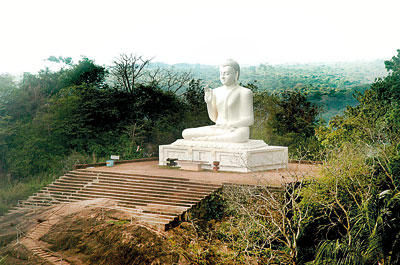Sunday Times 2
Theravada Buddhism is a cultural heritage of Sri Lanka
View(s):By Tassie Seneviratne
President’s Counsel Manohara de Silva’s (M.deS) book on Amendments to the Constitution was launched recently at the Sri Lanka Foundation Institute attended by a mammoth crowd including myself. The issues raised by him are very pertinent and I am with him all the way. He signals an ominous trend that is taking the country towards disintegrating its unitary status due to unscrupulous politicking. I am however dismayed to find an erudite person such as M.deS too taking Buddhism to be a religion, because Theravada Buddhism as taught in Sri Lanka over centuries is clearly not a religion. In chapter 12 (a) at page 165 of his book MdeS gives the heading as “Buddhagama” whereas it should be “Buddhism” (Buddha Dharmaya) because Buddhism is not a religion (‘agama’)

Mihintale where Buddhism was introduced to Sri Lanka. There should be constitutional provision to protect Theravada Buddhism
The earliest records of the Buddha’s teachings have it that ‘Theravada’ means ‘the doctrine of the elders’. In order to preserve these teachings for posterity, the Buddha established the order of Bhikku’s (monks – the Sanga) to pass his teachings on to subsequent generations of lay people and monastics, alike.
Unlike the scriptures of many of the world’s religions, Theravada Buddhism is not regarded as gospel – as an unassailable statement of divine truth to be accepted purely on faith. It is a philosophical quest for ‘awakening’ by direct experience.
Ven. Ananda, the Buddha’s cousin and close personal attendant, committed the Budda’s sermons (suttas) to memory and thus became a living repository of these teachings. Shortly after the Budda’s death in 480 BC, 500 of the most senior monks – including Ananda – started reciting as well as verifying all the sermons they had heard during the Budda’s teaching career. Most of these sermons, you will see, begin with the disclaimer, “Evan me Sutan” – “This I have heard”. Believing the words of these teachings will not take one anywhere, but verifying by personal experience adhering to the precepts as had been done by the aforesaid monks, is the only way one can verify the teachings. It is also the only way to promote Buddhism. You can protect and preserve Buddhism by Constitutional Amendments but you cannot promote Buddhism with Constitutional Amendments. In fact the conduct of most of the vociferous protagonists for Constitutional Amendments to promote Buddhism is a disgrace to Buddhism.
The Buddha on account of his spiritual attainment and teachings, I believe, is the greatest and noblest spiritual teacher to be born on earth by natural birth. It is Sri Lanka that has protected and preserved Theravada Buddhism over the centuries.
It will not be inappropriate to have a provision in the Constitution to protect and preserve Theravada Buddhism as a cultural heritage of Sri Lanka. No religion can take issue with this. I, as a Christian, have no issue at all with this. In fact I am all for a Constitutional provision to protect and preserve Theravada Buddhism as a Cultural Heritage of Sri Lanka.
(Tassie Seneviratne is a longstanding defender of the Constitution and Constitutional rights guaranteed to the people)
(The writer was a Senior Superintendent of Police.)

